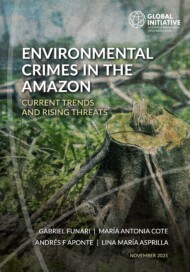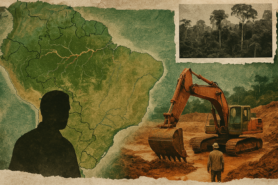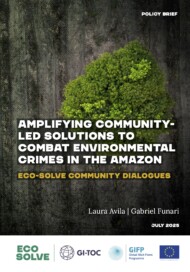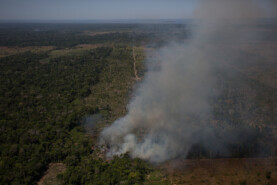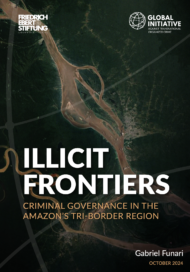Posted on 08 Nov 2025
The Amazon Basin is facing a surge in environmental crimes that threaten both ecosystems and communities. This report provides an in-depth analysis of the criminal economies driving deforestation and illegal mining across the region.
Drawing on original field research and secondary data, the report reveals how environmental crimes have become deeply intertwined with broader illicit economies, including drug trafficking, arms smuggling, and human exploitation. These interconnections underscore the need for a comprehensive, multi-sectoral approach to addressing the region’s environmental crisis.
A key finding is the exponential growth of illegal gold mining, now one of the most pervasive criminal markets in the Amazon. More than 4,000 illegal mining sites were identified across the region in 2023. Gold’s record prices —reaching US$3,500 per ounce in 2025— have made it an increasingly attractive avenue for organized crime groups seeking to launder drug trafficking profits. In areas such as Brazil’s Yanomami territory and the Tapajós River Valley, illegal mining has become a key source of income and employment, highlighting the socio-economic dependencies that make enforcement complex.
The report also identifies deforestation hotspots in Colombia’s Guaviare region and Brazil’s Pará, Mato Grosso, Rondônia, and Acre states, as well as along the BR-319 highway. Criminal organizations have adapted their methods to evade detection, infiltrating state carbon credit markets and exploiting loopholes in regulatory systems. These developments expose vulnerabilities in climate finance mechanisms intended to support conservation.
The analysis highlights five systemic gaps undermining current responses: the lack of a holistic criminal ecosystem approach; the overlap between legal and illegal markets; weak enforcement against illegal mining; insufficient anti-corruption measures; and the failure to address socio-economic drivers that sustain illicit economies.
To respond effectively, the report calls for:
- Country-specific and context-driven cooperation strategies.
- Strengthened intelligence sharing and cross-border task forces.
- Targeted interventions to dismantle illicit gold and mercury supply chains.
- Greater oversight of carbon credit markets to mitigate fraud.
- Investment in community-led protection initiatives empowering local and Indigenous groups.
By recognizing environmental crime as part of a broader transnational organized crime framework, the report urges governments and partners to move beyond isolated enforcement actions and adopt coordinated, intelligence-based responses.
